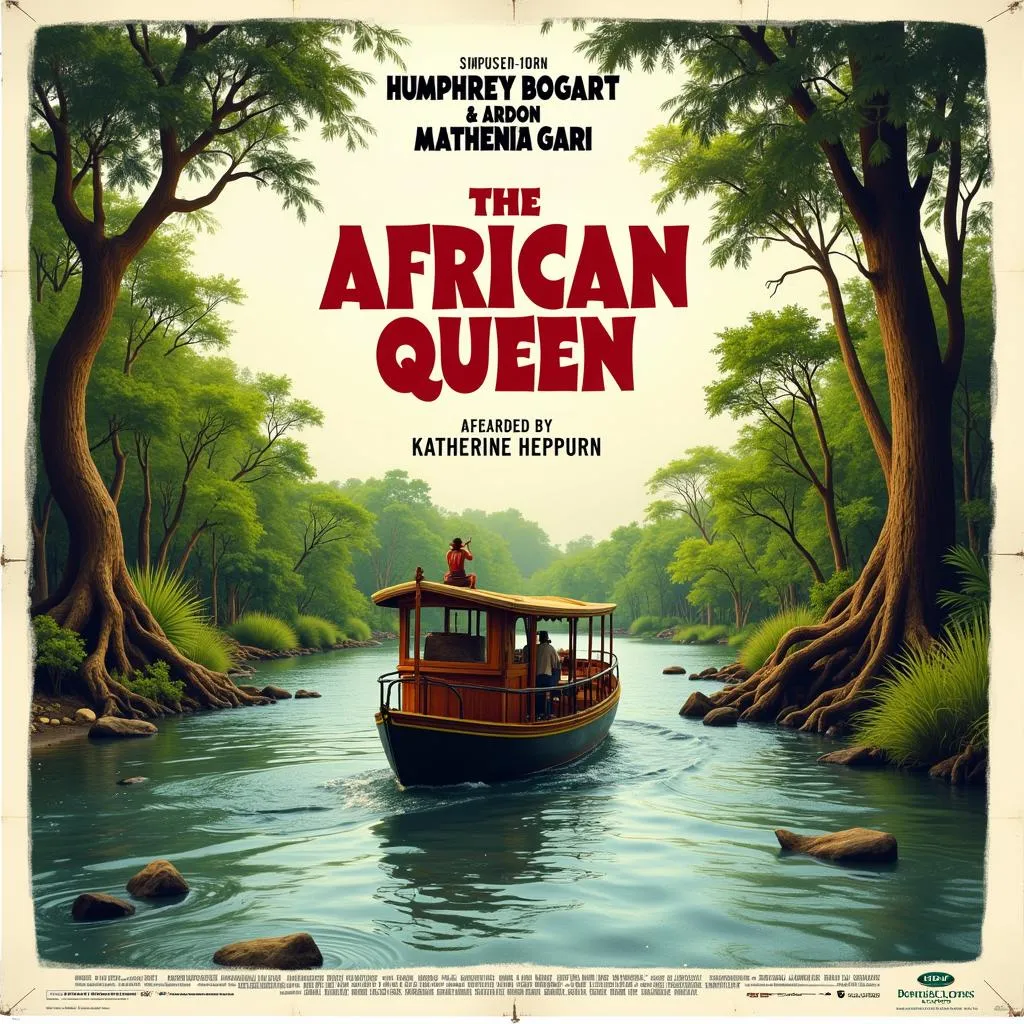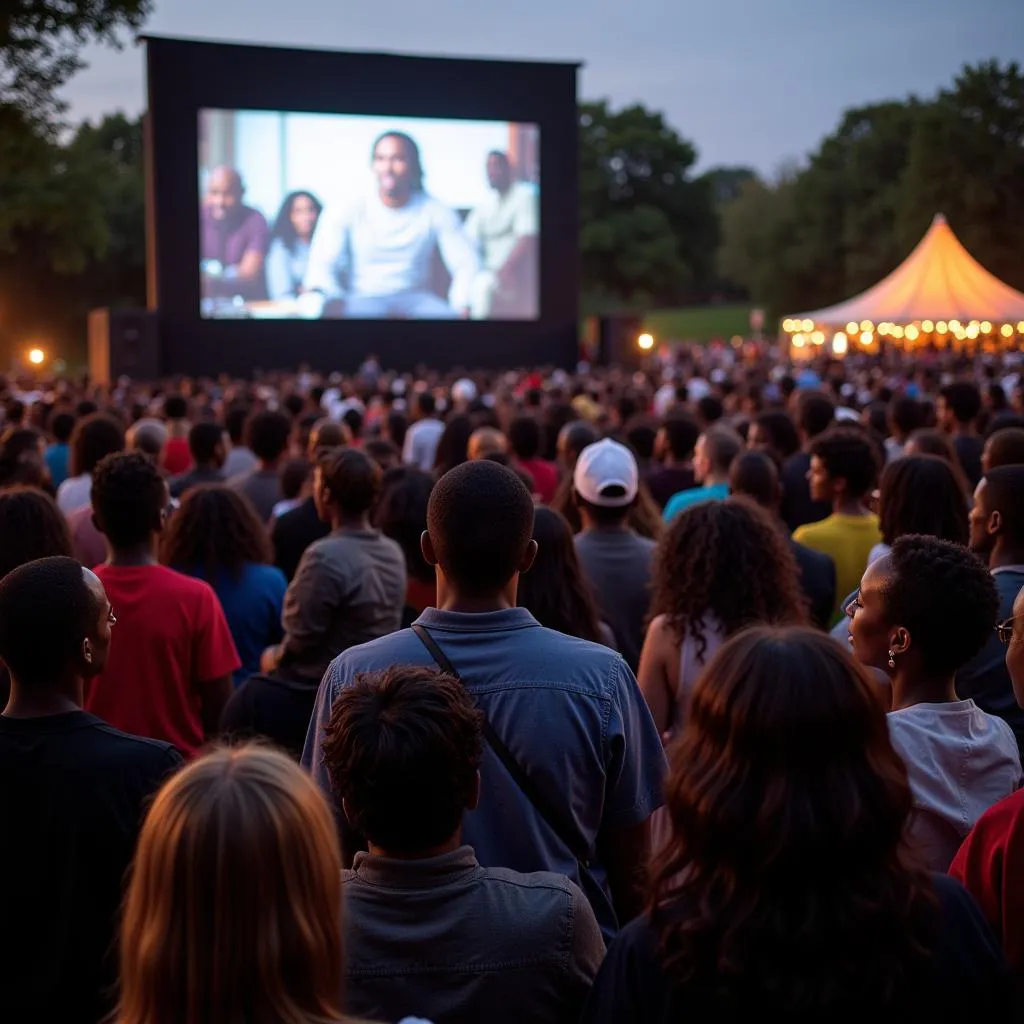A Journey Through Time: Exploring African History Movies
Movies offer a powerful medium to transport us through time, allowing us to experience historical events and cultural nuances in captivating ways. African history, rich and complex, has inspired a growing number of filmmakers to bring its stories to the big screen. From epic tales of ancient empires to poignant portrayals of colonial struggles and modern-day triumphs, African History Movies offer viewers a glimpse into a continent brimming with diverse cultures, perspectives, and narratives.
 The African Queen Movie Poster
The African Queen Movie Poster
Beyond Hollywood: Unveiling Authentic African Narratives
For many years, the portrayal of Africa in cinema was largely shaped by Western perspectives, often perpetuating stereotypes and overlooking the continent’s multifaceted realities. However, a new wave of African filmmakers is emerging, determined to reclaim their narratives and present authentic stories that reflect the continent’s true diversity. These films delve into themes of identity, colonialism, family, love, and resilience, offering nuanced perspectives that challenge preconceived notions and foster cross-cultural understanding.
One powerful example is “The Battle of Algiers” (1966), a gripping portrayal of the Algerian War of Independence that sheds light on the human cost of colonialism and the struggle for liberation. Similarly, “Hotel Rwanda” (2004) tells the harrowing true story of the Rwandan genocide, highlighting the courage of ordinary people in the face of unimaginable brutality. These films, among many others, demonstrate the power of cinema to educate, inspire, and spark dialogue about critical social and historical issues.
A Continent of Stories: Exploring Diverse Genres and Themes
African history movies encompass a wide range of genres, from historical dramas and biopics to documentaries and even animation. This diversity reflects the richness of the continent’s history and the creativity of its filmmakers. For instance, “Sarafina!” (1992) uses music and dance to depict the Soweto Uprising in South Africa, while “The Boy Who Harnessed the Wind” (2019) tells the inspiring true story of a young boy in Malawi who builds a windmill to save his village from famine.
 Black Panther Movie Poster
Black Panther Movie Poster
Animation has also emerged as a powerful tool for storytelling, with films like “Kirikou and the Sorceress” (1998) drawing on West African folklore to entertain and educate audiences of all ages. From ancient Egypt to modern-day Africa, these films offer a captivating glimpse into the continent’s vibrant cultures, traditions, and historical milestones.
Why Watch African History Movies?
Watching African history movies provides more than just entertainment; it offers a window into understanding the past, present, and future of a continent often misrepresented in mainstream media. Here are a few compelling reasons to explore the world of African cinema:
- Gaining New Perspectives: By stepping outside familiar narratives, you’ll encounter fresh viewpoints on historical events and cultural practices, challenging your own biases and broadening your understanding.
- Celebrating Cultural Richness: African history movies showcase the continent’s vibrant arts, music, languages, and traditions, offering a sensory immersion into diverse cultures.
- Learning from the Past, Inspiring the Future: Many films delve into difficult historical periods, offering valuable lessons about resilience, social justice, and the fight for equality.
- Supporting African Filmmakers: Choosing to watch these movies directly contributes to the growth and recognition of talented filmmakers from the continent.
Where to Begin Your Cinematic Journey
With such a diverse array of African history movies available, it can be challenging to know where to start. Here are a few suggestions:
- Classics: Begin with acclaimed films like “The Battle of Algiers” (1966), “Xala” (1975), or “Hyènes” (1992) to gain a foundational understanding of African cinema’s evolution.
- Modern Masterpieces: Explore recent award-winning films like “Timbuktu” (2014), “The Wound” (2017), or “Atlantics” (2019) for contemporary perspectives and innovative storytelling.
- Documentaries: For a deeper dive into specific historical events or social issues, consider documentaries such as “The Act of Killing” (2012) or “Concerning Violence” (2014).
- Family-Friendly Options: Introduce younger audiences to African cultures and stories with animated films like “Kirikou and the Sorceress” (1998) or “Azur & Asmar: The Princes’ Quest” (2006).
 African Movie Festival Crowd
African Movie Festival Crowd
No matter where you choose to begin, exploring the world of African history movies promises a rewarding experience. As you immerse yourself in these captivating stories, you’ll gain a deeper appreciation for the richness, complexity, and resilience of the African continent and its people.
Conclusion: Embark on Your Own Exploration of African History Movies
African history movies offer a powerful lens through which to engage with the continent’s past, present, and future. Beyond entertainment, they provide valuable insights into diverse cultures, spark important conversations, and challenge us to see the world from new perspectives. So, embark on your own cinematic journey and discover the captivating world of African history movies. You may be surprised by what you learn and the connections you make.
